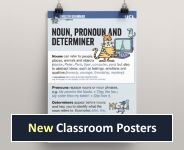Topic: Auxiliary verb
Auxiliary verbs are 'helping verbs', which always accompany the main verb. They help to form questions, negatives and passive sentences, and to express aspect.
Englicious contains many resources for English language in schools, but the vast majority of them require you to register and log in first. For more information, see What is Englicious?

